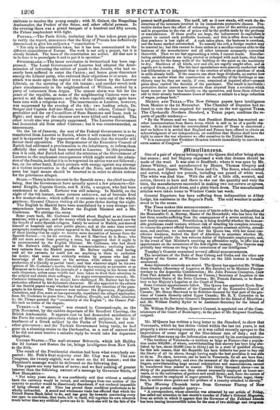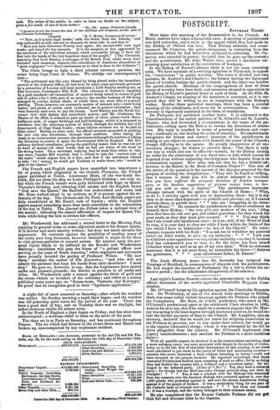miscellaneous.
One of a pair of alpacas belonging to the Queen died after being shorn last season ; and her Majesty expressed a wish that dresses should be made of the wool. It was sent to Bradford; where it was spun by Mr. , James Whitley, and manufactured by Messrs. Thomas Gregory and Brothers, and Messrs. William Fison and Co. The fleece, when combed and sorted, weighed ten pounds, including one pound of white wooL The white was died blue. With the aid of a little silk, worsted, and cotton, thrown in here and there to eke out the quantity and vary the tints, the manufacturers succeeded in making two cot-covers or aprons, a striped dress, a plaid dress, and a plain black dress. The manufactured articles were taken home to Windsor Castle last week.
General Espartero has been suffering from indisposition at Abbey Lodge, his residence in the Regent's Park. The cold weather is under- stood to be the cause.
The Times makes this announcement-
" We have had occasion more than once of late to refer to the indisposition of the Honourable C. A. Murray, Master of the Household ; who has been for the last three months suffering from the consequences of a severe accident, but is now nearly convalescent. Nevertheless, it being doubtful whether the honour- able gentleman could venture, without risk of retarding his complete recovery, to resume his present official functions, which require constant activity, attend- ance, and exertion, we understand that the Queen has, with her usual con- siderate kindness, desired the Earl of Aberdeen to ascertain whether Mr. Murray would prefer the less arduous duties of diplomatic employment, and, in the event of that Minister's receiving an affirmative reply, to offer him an appointment on the occurrence of the first eligible vacancy. The Gazette may probably bear witness ere long to the correctness of our intelligence."
Tuesday's Gazette contained several official announcements.
The investiture of the Duke of Saxe Coburg and Gotha and the other new Knights of the Garter at Windsor Castle on the 12th instant is formally
announced.
Some diplomatic removals are stated. The Queen has appointed Mr. William Gore Ouseley (Secretary of Legation at Rio Janeiro) to be Minister Plenipo- tentiary to the Argentine Confederation; Mr. John Fiennes Crampton, (now First Paid Attache to the Embassy at Vienna,) Secretary of Legation to the Confederated States of the Swiss Cantons ; Mr. Francis Farrant, to be Secre- tary to her Majesty's Legation at the Court of Persia.
Some Colonial appointments follow. The Queen has appointed Denis Ben- jamin Viger to be President of the Committee of the Executive Council of Canada ; Mr. Henry Sherwood to be Solicitor-General for that part of the pro- vince of Canada formerly called Upper Canada; Mr. R. Y. Cummins to be Accountant to the Surveyor-General's Department for the Island of Mauritius ; and Mr. William Dudley Ryder to be Assistant-Secretary for the Island of Ceylon. Mr. William Fuller Boteler, Queen's Counsel, I. appointed one of the Com- missioners of the Court of Bankruptcy, in the place of Mr. Sergeant Goulburn, resigned.
Mr. M'Qneen has written a long letter to the Standard, to show that Venezuela, which he has thrice visited within the last ten years, is not properly a slave-owning country, as it was called recently apropos to the , importation of some sugar at the free-labour rate of duty ; and the Standard thus sums up the information conveyed by its correspondent- " The territory of Venezuela—a territory as large as France—has a popula- tion under 900,000; of whom, notwithstanding that slavery has been long abo- lished by law, about 30,000 (one in thirty) are in a state of qualified slavery, for this sole reason, that the Republic has been hitherto too poor to buy out the liberty of all its slaves, though having made the best provision it was able to do so. No slave, however, can be born in Venezuela, for all are born free; no slave can be imported; and even the remnant of the slave-population that lingers, notwithstanding large annual redemptions and manumissions, cannot be transferred from master to master. The thirty thousand slaves—one in thirty of the population—are thus almost necessarily employed as house-ser- vants, or in the cultivation of gardens and small farms; and, from the nature of things, cannot be employed in sugar-grounds. The Venezuelan sugar, there- fore, is neither slave-grown nor the produce of a country attached to 11;very.7 The Morning Chronicle turns from Governor Fitzroy of New Zealand to pursue smaller quarry- " A correspondent, whose attention was attracted by our article of Fridays. has has called our attention to last month's number of Fisher's Colonial Magau from an article in which it appears that the Governor of the Falkland IsLadel has been issuing inconvertible uotes for the sum of two shillings sad tearless each. The writer of the article, in order to leave no doubt on the subject, gives a fee-simile of one of these notes-
• No. 159. Anson, Falkland Islands. ` I promise to pay the bearer the sum of two shillings and twopence, on the part of the Colonial Government.
(Signed) • R. C. Moody. Lieutenant-Governor.' "' Now, as it is here legal tender,' adds the writer from the Islands, ' and only redeemable at will, and not on demand, we must take it, and keep it.' Here you have Governor Fitzroy over again : the inconvertible note legal tender, and issued for low amounts. It is the assignat, in fact, aggravated by the smallness of the individual amount, which necessarily brings it from the first into the hands of the very humblest class of the people." [The Chronicle, assuming that Lord Stanley, a colleague of Sir Robert Peel, could never have intended such measures, imputes this coincidence of disastrous absurdities to " gross negligence "—" sheer carelessness as to what is done in the Colonies."] The Globe brings to light a third colonial currency question, the scene being Cape Coast in Guinea. We abridge our contemporary's text- " The settlement was this year blessed by being placed under the immediate control of the Colonial Office, (it had been for many years previously governed by a committee of London and local merchants ;) Lord Stanley sending out, as first Governor, Commander Hill, R.N. The currency of Guinea is regulated by a gold standard—all transactions of moment being valued in ounces of gold and in ackies (the 1-16th part of an ounce) ; the smaller business of life being managed by couries, Indian shells, of which there are some fifty to a penny sterling. These, however, are commonly monies of account only—trade being barter, and pieces of cotton cloth (romauls) are in general circulation ; they were formerly used even to pay the troops. Lord Stanley and his Naval Go- vernor view with disdain this uncivilized system ; and Mr. Gladstone, the Master of the Mint, is ordered to pack up chests of silver pieces worth three- halfpence each, of copper farthings and half-farthings, which it is proposed to introduce into the monetary system of Africa through the military and civil departments of Cape Coast Castle ; whose inferior servants are to be paid in these coins! Having no other cash, the official servants succeeded in pushing the new coin into circulation, through their creditors. After taking the trash to an inconvenient amount, the merchants bethought themselves of asking the Governor to receive it again for Government bills on England. His Ex- cellency declined compliance, giving the gratifying reason that he was not yet in want of money—in other words, that he had yet stores of the trash in his strong boxes. On a merchant replying that he must then refuse to take any more, Captain Hill retorted, that a refusal to take the current coin of the realm' would expose him to a flue; and that if the merchants refused to take his ' money, he would get Yankees to settle there, who ' would be glad of the chance.' " The French and English papers have magnified into importance a bit of gossip which originated in the Oceanie Franfaise, the French paper published at Tahiti. Lieutenant Hant, of the war-ketch Ba- silisk, did not dress his ship on Louis Philippe's birthday : not only so, but while the French vessels were gaily decorated with flags on Queen Victoria's birthday, and vibrating with salutes and the English hymn " God save the Queen," the Basilisk was undecorated and mute, and Mr. Hunt walked about in an undress, as if to protest against the so- lemnity of the day. The Ocianie and the Paris Anti-British papers are duly scandalized at Mr. Hunt's lack of loyalty ; while the English papers suspect something more than mere courtesies in the solemnities of the day at Tahiti. The Journal des Debats takes a rational view of the matter ; ridiculing the absurd affectation of respect for Queen Vic- toria while doing the best to irritate her officers.
Mr. Wordsworth has addressed a second letter to the Morning Post, replying in general terms to some objections made to his former epistle. It is shorter and more smartly written ; but does not much advance his arguments. He contends against the possibility of sending many of the really poor long distances, however desirable it might be for them to visit picture-galleries or natural scenes. He touches upon the per- sonal injury likely to be inflicted by the Kendal and Windermere Railway : omnibuses will pass the house of "a gallant officer now serving on the coast of South America," while engineers and surveyors have actually invaded the garden of Professor Wilson. " He saw them," exclaims the author of The Excursion ; "and who will not admire the patience that kept his hands from their shoulders? I must stop." He goes on, however, to say, that the Legislature have spared Darks and pleasure-grounds: the district in question is all parks and villas. Mr. Wordsworth adds a sonnet against the thirst of gold and the steam-whistle as invaders of the solitudes ; and refers to a sonnet published some years ago, on "Steam-boats, Viaducts, and Railways," for proof that he recognizes good in their "legitimate application."
A slight fall of snow occurred on Saturday ; after which the weather was milder. On Sunday morning a rapid thaw began ; and the weather was till yesterday quite warm for the period of the year. There has been a good deal of fog; and on Tuesday there was no daylight, but rather darkness visible till almost noon.
In the North of England a thaw began on Friday, and has since been uninterrupted ; a welcome relief to fears on the score of the poor.
The thaw set in at Paris on Saturday, and has continued throughout France. The ice which had formed in the rivers Seine and Marne had broken up, unaccompanied by any unpleasant incident.
BANK or ENGLAND.—Au Account, pursuant to the Act 7th and 8th Vic- toria, cap. 32, for the week ending on Saturday the 14th day of December 1844. ISSUE DEPARTMENT.
Notes issued £28,003,705 Government Debt £11,015,100
Other Securities 2,984,900
Gold Coin and Bullion 12,410,034
Silver Bullion 1,593,611
£28,003,705
£28,003,705
BANKING DEPARTMENT.
Proprietors' Capital £14,553,000 Government Securities, (in-
Rest 3,105,886 eluding Dead Weight An-
Public Deposits, (including
nuity) 4613,540,619 Exchequer, Savings Banks,
Other Securities 10.291,154 Commissioners of National
Notes 8,745,540 Debt, and Dividend Ac.
Gold and Silver Coin 840,589 taunts) 6,3135.654
Other Deposits 8,381,188
Seven-Day and other Bills 994,174
A88,419,902 £38,419,902 Dated the 19th day of December 1844. M. Haammt... Chief Cashier.



























 Previous page
Previous page